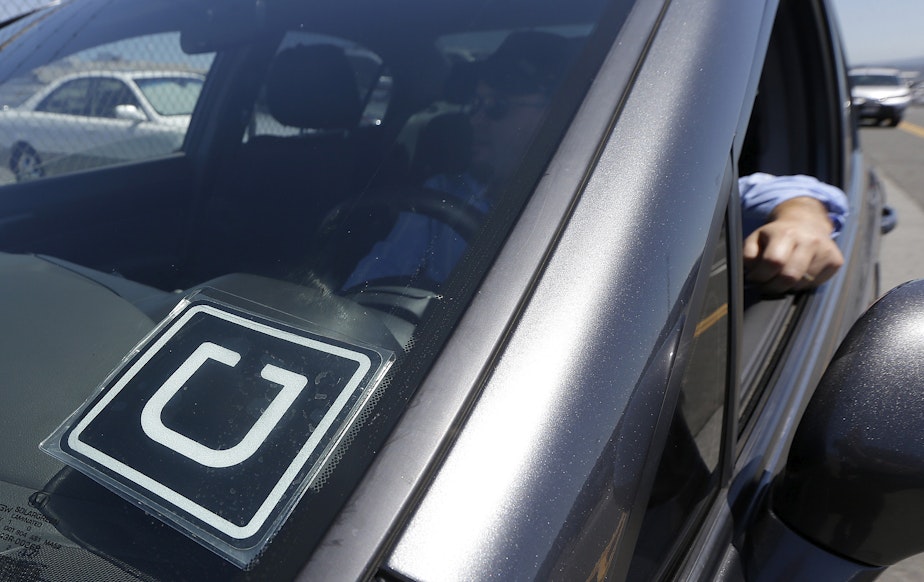Seattle wants new rules for Uber and Lyft. Here's what that could mean

The Seattle City Council unanimously passed a resolution Monday to consider regulating transportation network companies like Uber and Lyft.
The city could end up raising base fares to $2.40, which is the minimum fare charged by taxis. Currently, both Lyft and Uber charge $1.35 as a base fare in Seattle.
Kim Malcolm talks with journalist Kevin Schofield about the impact of potential regulations on drivers and consumers.
What regulations are the City Council considering?
Schofield: They want to make sure there's a minimum amount that Uber and Lyft passengers pay per mile.
Sponsored
And they really think this is going to do two things:
The first is make sure there's a level playing field with taxi drivers, because the fares that taxis charge are highly regulated. They’re fixed. But Uber and Lyft vary their fares over time. [The City Council] want to make sure there's fair competition.
The other thing is they want to make sure there’s a fair wage for Uber and Lyft drivers — that they're not being paid under minimum wage. And for those who are driving full time, they can really put food on the table.
There is a difference in how the drivers see this. Lay it out for the full-time drivers. What are their concerns?
This is their full-time job. Some of them work anywhere from 35 to 60 or more hours a week.
Sponsored
They want to make sure they're compensated fairly, and that they're making enough money to cover their expenses. They’re independent contractors, and they have to do maintenance and clean their cars. They have to pay all the licensing fees.
And for the part-time drivers, what are their concerns?
This is supplementary income for them. Some of them are retired. Some of them are just trying to use this as an extra job on the weekend or in the evenings to make some additional cash.
For them the most important thing is flexibility. Their biggest worry is they're going to end up being scheduled. If they end up being represented by a union, or if these regulations end up in place, they’re worried somebody is going to try to tell them what hours they can work.
How will consumers be affected by all of this?
Sponsored
One piece of this is whether they'll end up paying a little bit more for rides.
On paper, there have been a bunch of studies that say Uber is actually losing money today, and they're subsidizing the business with venture capital money. But that will eventually run out, and rates may go up anyway.
Uber and Lyft will still be free to do surge pricing in cases where there’s really high demand. What the council is talking about doing would only affect the minimum fare they can charge – not the maximum.
If the City Council decides to raise compensation, what long-term effects do you see on the ride hailing business here in Seattle?
I think it'll make it more practical for people to continue to do driving as a full-time job.
Sponsored
Because that's one of the big questions here: Are there jobs in the long-term as full-time drivers? Or is it all going to be part-time drivers both for taxis and for Uber and Lyft?
How do you see this affecting the immigrant community here in Seattle and King County?
Immigrants who have spoken at City Council meetings say this is one of the few jobs they could get when they first arrived in the country.
They may have to go back to school to get certificates to do other things that they did back in their home country. But this is something they could do immediately to support their families.
So they feel particularly vulnerable in this space. Council President Bruce Harrell is really sensitive to that point. And he wants to make sure that we do the right thing for the immigrant community here in Seattle


